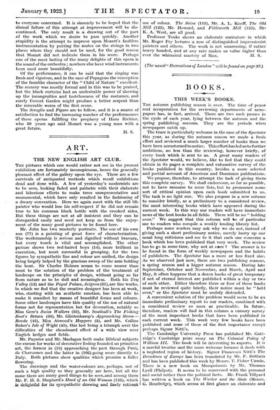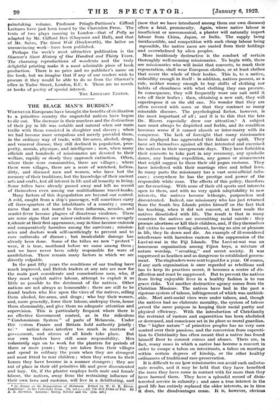BOOKS.
THIS WEEK'S BOOKS.
Tan autumn publishing season is over. The time of peace and recuperation for the reviewing departments of news- papers has, in fact, arrived. There are two such pauses in the cycle of each year, lying between the autumn and the spring publishing seasons. They are the periods when newspapers catch up.
The truce is particularly welcome in the case of the Spectator this year, as during the autumn season we made a fresh effort and reviewed a much larger number of books than we have been accustomed to notice. This effort has led us to further ambitions, no less than the reviewing, however briefly, of every book which is sent to us. A great many readers of the Spectator would, we believe, like to feel that they could obtain in its pages a complete and exhaustive survey of the books published in this country, besides a more selected and partial account of American and Dominion publications.
We propose, therefore, to attempt the task of giving them. this complete survey. We shall endeavour, so far as possible, not to have recourse to mere lists, but to pronounce some sort of critical opinion upon each book submitted to us. The task is no light one. We also propose in a new column to consider briefly, as a preliminary to a considered review, the most interesting books which have appeared during the current week. In this way our readers will have immediate news of the best books in all fields. There will be no " holding over." We suggest that this column will he of particular use to readers who compile a weekly lending library list.
Perhaps some readers may ask why we do not, instead of giving such a short preliminary notice, merely hurry up our usual long criticisms and see to it that each one concerns a book which has been published that very week. The review has to go in some time, why not at once ? The answer is to be found in the form of weekly newspapers and the habits of publishers. The Spectator has a more or less fixed size. As we observed just now, there are two publishing seasons, a spring season and a bigger autumn season. During late September, October and November, and March, April and May, it often happens that a dozen books of great temporary if not of eternal interest are published within a day or two of each other. Either therefore three or four of these books must be reviewed quite briefly, their notice must be " held over," or the Spectator must be unduly distended.
A oonvenient solution of the problem would seem to be an immediate preliminary report to our readers, combined with a considered review so soon as practicable. In future, therefore, readers will find in this column a cursory survey of the most important books that have been published in each current week. This week very few books have been published and none of these of the first importance except perhaps Signor Nitti's.
The Cambridge University Press has published Mr. Gutt- -ridge's Cambridge prize essay on The Colonial Policy of William III. The book will be interesting to experts. It is a careful treatise and the more welcome because it deals with a neglected region of history. Signor Francesco Nitti's The Decadence of Europe has been translated by Mr. F. Brittain and has been published this week by Messrs. T. Fisher Unwin. There is a new book on Mesopotamia by Mr. Thomas Lyell (Philpot). It seems to be concerned with the personal and social rather than the political facts. Mr. Frank Tillyard has written a book on The Worker and the State (Messrs. G. Routledge), which seems at first glance an elaborate and painstaking volume. Professor Pringle-Pattison's Gifford Lectures have just been issued by the Clarendon Press. The texts of two plays running in London—that of Polly as adapted by Mr. Clifford Bax (Chapman and Hall), and that of Mr. Sutro, The Great Well (Duckworth), the latter an unconvincing work—have been published.
Perhaps the week's most attractive publication is the Observer's Short History of One Hundred and Thirty Years. The charming reproductions of woodcuts and the truly delightful printing make it a most admirable piece of book production. There is no price and no publisher's name on the book, but we imagine that if any of our readers wish to procure it they would be able to do so from the Observer's office in Tudor Street, London, E.C. 4. There arc no novels or books of poetry of special interest.
THE LITERARY EDITOR.



















































 Previous page
Previous page